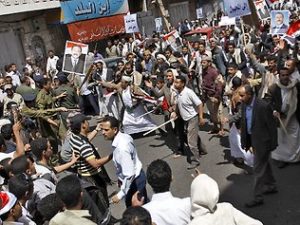 In keeping with other dictatorships in the region, Yemen’s regime decided from the very beginning of the uprising to emulate its Egyptian counterpart in the use of “thugs”, to not only create terror amongst the protesters but also to play the all-important card of denial.
In keeping with other dictatorships in the region, Yemen’s regime decided from the very beginning of the uprising to emulate its Egyptian counterpart in the use of “thugs”, to not only create terror amongst the protesters but also to play the all-important card of denial.
Although nothing in Yemen was as flagrant as the Egyptian “camel incident”, President Saleh has been using the same destructive and violent policies against his own people, sending his loyal supporters to slaughter and incarcerate those who dare defy his rule.
Civilian Clothing
Residents in the capital Sana’a have, on many occasions, reported that men from the elite unit the Republican Guard have been disguising themselves, infiltrating the demonstrations in order to better gather information from the anti-Saleh protesters.
Men from the Central Security Forces, under the control of the President’s nephew, Yehia Abdullah Saleh, also used the anonymity of civilian clothes to position themselves on the outskirts of “Change Square”, the protesters main gathering point at Sana’a University, north of the capital, in order to better target small groups of pro-democracy activists.
A few months back, Maher Hassan, a youth protester, was drenched in gasoline before being set on fire by Central Security Forces men. As a result of the brutal attack, Maher had to undergo a series of painful surgeries; he is still recovering from his wounds, the cruelty of a regime that refused to listen forever engrained on his flesh. In Taiz, the regime has been using undercover snipers to shoot down protesters while they are marching, claiming afterwards that the men were dissident elements linked to either al-Qaeda or defected General Ali Mohsen al-Ahmar.
The Tribes
Not content with employing only government forces to crack down on protesters, the regime is also putting tribesmen on their payroll. Sources close to the presidential palace have claimed that the government was spending high sums to ensure tribesmen loyalty, offering them lodging, food and monetary compensation whenever they would agree to travel to the capital. The men had a dual purpose, some were instructed to join the pro-government rally on Friday, while others were asked to go to the Square baring arms in order to incite unrest. They have now been asked to patrol the streets of the capital, acting as spies for the regime.
Only a few days ago, a Sana’a resident, Abdel Fattah, was traveling in a cab with both of his children when the boys started screaming anti-government slogans throughout the open windows. A few minutes later the cab was rammed by an unmarked car filled with tribesmen. Barking insults at the cab’s passengers, the men started beating up the father and his children, screaming that they needed to be taught a lesson. Residents stood silent while the incident took place, too terrified to intervene.
Mercenaries
Since his surprise return from the Kingdom of Saudi Arabia, embattled President Saleh has been adding yet another arrow to his bow by hiring foreign mercenaries. Already, anonymous military sources have told the press that the regime replaced its Yemeni air force pilots with Syrian and Iraqi fighters to ensure that they would follow orders to shoot at civilian populations. The mercenaries were subsequently ordered to fire upon the villages of Arhab and Naham with total disregard to the many innocent lives they were shattering along the way.
Only a couple of weeks ago, as Yemen was rocked by its worst week of violence with over 130 deaths and thousands of casualties, troops loyal to the revolution captured 7 African mercenaries. The men were immediately imprisoned and interrogated. One of Mohsen’s high ranking officers later revealed that the men had been hired by Ahmed Saleh, President Saleh’s eldest son and head of the Republican Guard to loot businesses and disrupt the public order.